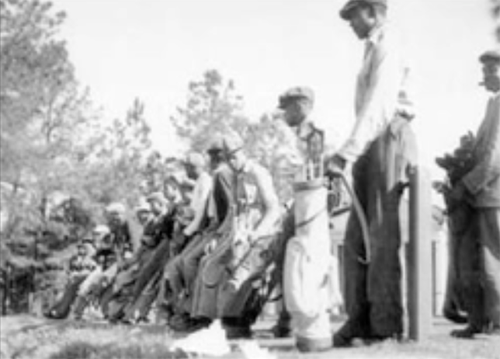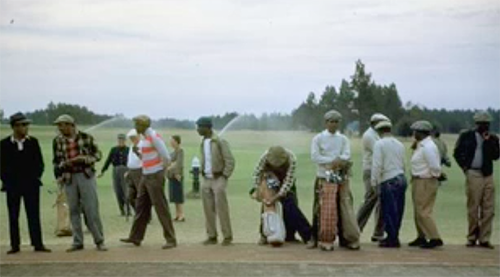Lucius Bateman, the San Francisco Bay Area’s black golf professional who had coached so many outstanding players. Bateman passed away in 1975, but not before leaving a tremendous impression on the local golf scene, including here in Alameda.
Both Charlie Sifford and Calvin Peete lifted themselves above racial prejudice to make important contributions to golf. Bateman did it in a very different way.
Sifford won the Greater Hartford Open in 1967, six years after the PGA dropped its Caucasian-only rule. He won the Los Angeles Open in 1969, and followed that by victories on the senior tour. Peete joined the tour in 1976. He broke through with a victory at the 1979 Greater Milwaukee Open.
Bateman, who was older than Sifford and Peete, had set many local course records, but by the time the tour was open to black players he was well past his prime. So he put all his energy into coaching young players — known as Bateman Boys — while working as head pro of Airway Fairways driving range, where the Oakland Hilton now stands.
Bateman’s record was impressive. His “boys” included Tony Lema, who won the British Open, as well as many well-known local stars who won tournaments throughout the state, went on the PGA and senior tours or became club pros. These include Don Whitt, John Lotz. Dick Lotz, John McMullin, Ross Randall, John Joseph, Al Braga, Jack Cummings, Randy Herzberg, Don Baucom, Dave Harris and Gary Plato.
Through these players, his most accomplished protégés, had he just vicariously put himself on the tour? No, his devotion to young players, no matter their potential, was selfless. He truly would have been embarrassed by the heartfelt gratitude voiced by many of his Boys during the 2009 Northern California PGA dinner at which Lucius was inducted as an honorary member.
Gary Plato, the former head pro at San Jose Country Club and a San Jose State golf standout who organized the evening, spoke for many of his peers when he proclaimed “I owe Lucius everything.”
After attending this tribute and on my way back to New York, I wondered what the members of the California Golf Writers, who had honored Bateman the previous year, would have written had he been able to compete on the tour in the late 1940s and ’50s. Would the outcome of the 1955 U.S. Open at the Olympic Club have been different? A three-way playoff involving Ben Hogan, Jack Fleck and you know whom?
Born in 1901 in Louisiana and raised in Biloxi on the Mississippi Gulf Coast, Bateman started his golf career caddying at the Edgewater Hotel and Golf Club in Biloxi, where he tied the course record as a teenager. The head pro hired him as an assistant “as much for his playing ability as his profound gift of communicating his insights into the game,” Plato said.
Bateman taught hundreds of youngsters by the time he left to serve in the Army Air Corps during World War II. After being honorably discharged in the Bay Area, he worked in several shipyards while setting records at many local golf courses: Alameda, Crystal Springs, San Mateo, Tilden, Hayward and the former Hillview in San Jose.
His play was not lost on Rig Ballard, the owner of Airway Fairways, who hired Bateman to manage this storied driving range. For 27 years Bateman ran the place as a sanctuary for kids from all social strata who loved golf. It was my first important realization that not all of my fellow players came from comfortable, middle-class homes in quiet, leafy Alameda.
Would Bateman still have found the time to inspire so many kids as he did for so many years if he had gone on tour? As one of his Boys I think so. Many of us never turned pro, including all the members of Alameda High School’s 1957 and 1958 ACAL championship golf teams, except Plato. Gary Gambetta became an AT&T executive; Lou Schmitz, an electrical contractor; Tom Himmelberg, a superintendent of schools; Ken Cummings, last said to be living in Arkansas where he probably retired on a golf course; Bill Ehrdahl, a State Department operative; and myself, a staff member for New Yorker magazine.
We all benefitted from Bateman’s inspiration on and off the golf course, where he instilled in us the joy of competing and a strong will to win. And, in what today would be described as risk management, Lucius taught us how to put a little money on our play. In return he asked very little of his Boys as Plato wrote: a “…commitment to fulfill their potential at everything they did; to behave with dignity on and off the course; and to treat others and themselves with respect.”
The last time I saw Bateman before his passing in 1972 was in the restaurant at the Alameda Golf Complex. He was seated, his mallet head putter at his side. “Mawdy, you still hookin’?” he asked as some kids around him chuckled.
At age 73, yes, I’m still fighting a hook, still trying to live up to his grace, his generosity and his patience. Still remembering his gentle kidding. And, of course, still remembering his storytelling that could start as he addressed the ball and continued through his swing, ending when he looked up at us rather than the ball and knowing exactly where it went.
I remember the happy times at Airway Fairways, hitting many more balls than we were expected to shag and targeting the poor guy in the caged Jeep that was trolling for balls out on the range.
I remember Hacker, the name Bateman fittingly gave to his loyal dog, and his Ford coup that, more often than not, was waiting alongside Alameda High ready to take us to the golf course.
I remember coming home from college and in his driving range office telling Bateman about the courses and opponents I’d played while on the golf team, oblivious of the hundreds of young players who had made the same pilgrimage back to the shrine before me and after.
Despite his accomplishments as a revered teaching pro, was he ever bitter about never having had the opportunity to go on the tour? When asked that question by Walt Roessing for Golf Digest, in the January 1965 issue, Bateman was quoted as saying that “My mother taught me that everything happens for the best. What may seem like a tough break often works out the other way. I have no complaints.”
Except one. Bateman never did collect the $5 from Charlie Sifford, but he inspired an army of young players — most of us now long in the tooth — but all of us better human beings for having been Bateman Boys.
Marty Ketels is the son of golfer Nadine Ketels McDonald. Nadine’s first teaching pro was Earl Fry, followed by Lucius Bateman. She served as president of the Pacific Women’s Golf Association. Marty played on Alameda High’s ACAL championship golf teams in the late 1950s. He worked for the National Golf Foundation and worked for the New Yorker magazine.
(source: Marty Ketels, Thursday, May 28, 2015, AlamedaSun.com)





